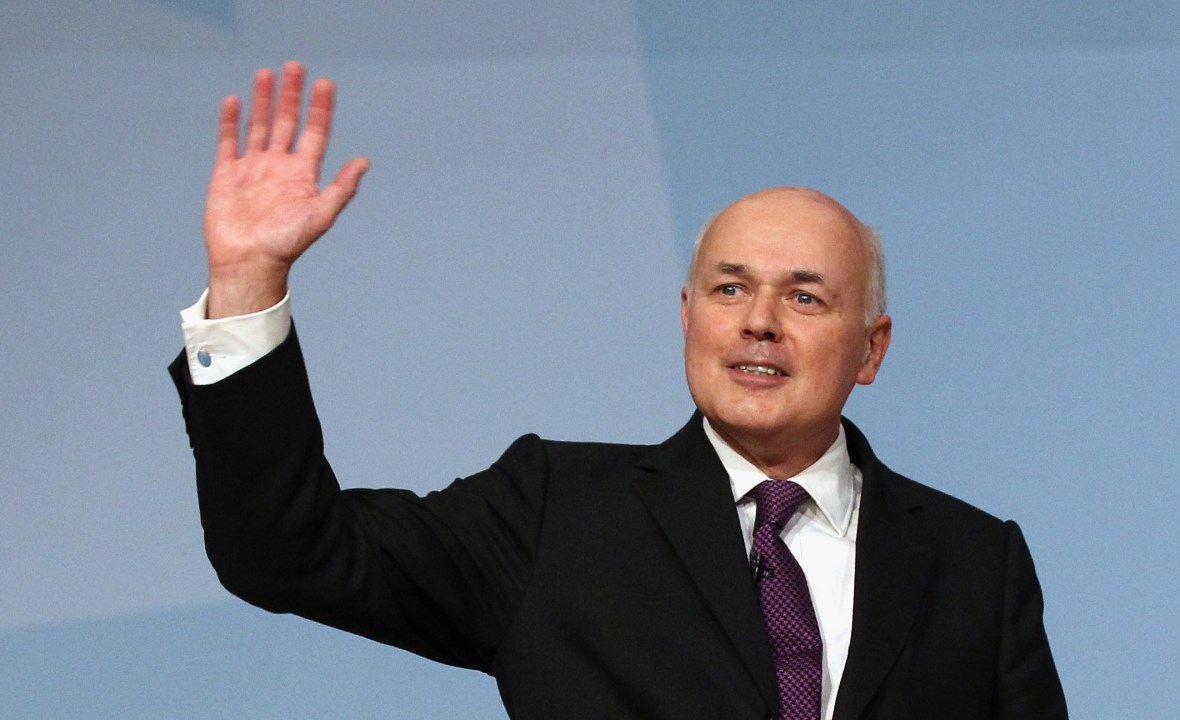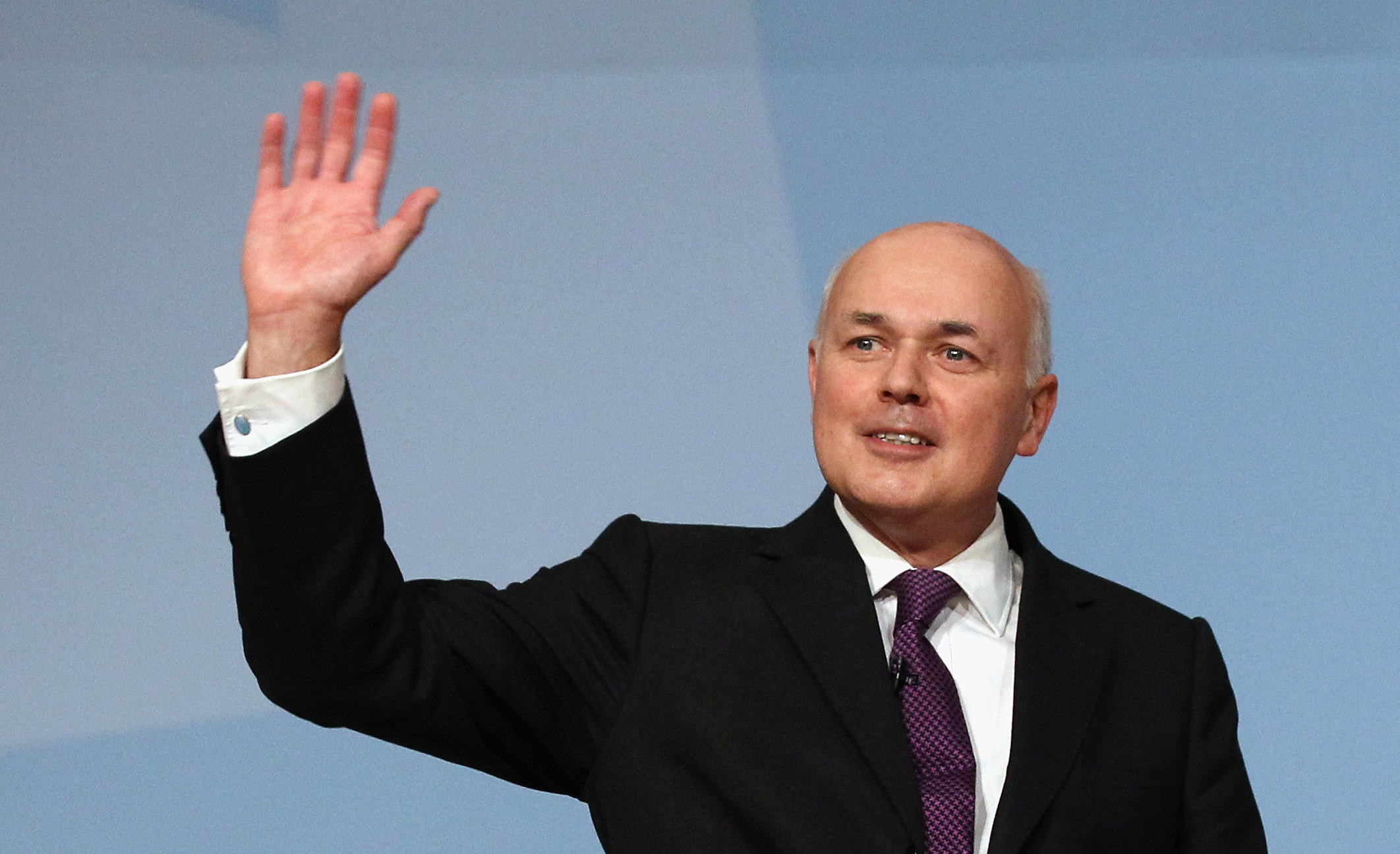 The largest welfare-to-work programme on the planet is launched today by Chris Grayling
and Iain Duncan Smith. It’s not much of an exaggeration to say that the future of this country — and, perhaps, David Cameron – depends on its success. The lead article of this
week’s Spectator looks at it, and we used various metrics — some of which puzzled David Smith of the Sunday Times. He understandably challenged our claim that 81 per cent of the new jobs created are accounted for by immigration. We had a Twitter
“conversation” about it earlier this morning, but some things you can’t explain in 140 characters. So here is my argument: complete with data, sources and assumptions. It’s a
long post, but this is — in my view — one of the most important debates in British politics and worth the length.
The largest welfare-to-work programme on the planet is launched today by Chris Grayling
and Iain Duncan Smith. It’s not much of an exaggeration to say that the future of this country — and, perhaps, David Cameron – depends on its success. The lead article of this
week’s Spectator looks at it, and we used various metrics — some of which puzzled David Smith of the Sunday Times. He understandably challenged our claim that 81 per cent of the new jobs created are accounted for by immigration. We had a Twitter
“conversation” about it earlier this morning, but some things you can’t explain in 140 characters. So here is my argument: complete with data, sources and assumptions. It’s a
long post, but this is — in my view — one of the most important debates in British politics and worth the length.
The 81 per cent figure
Cameron’s nightmare is that the economy recovers, but does so by sucking in immigrant labour rather than shortening British dole queues. The problems that existed under Labour remain still. The ONS figures are out for the first nine months of the Cameron years, and they suggest that 81 per cent of the rise in employment can be accounted for by more immigration. The 81 per cent figure is probably an understatement, because it includes pensioners returning to work. Here are the figures, from the ONS website:

Britain’s shame: Welfare Ghettoes
If Blake were writing ‘Jerusalem’ now, he’d find an easy equivalent of his “dark, satanic mills”. They are the welfare ghettos, zones of despair where no one works. And
they’re not a product of the recession, but years of Gordon Brown’s wilful neglect. As Chancellor he didn’t fight poverty, as he pretended to. He manipulated spreadsheets to cover
up poverty. His work was taking an arbitrary “poverty line” — 60 percent of the median income — and using tax credits to move people from just below this line to just above
it. So for £10 a week you could be deemed “lifted out of poverty” as if it were a binary distinction. This was a trick: a play on words, a play with statistics. It stood in lieu
of an anti-poverty agenda.
Worse, Brown had the audacity to boast about “full employment” because the claimant figure was low. But the number on Jobseekers Allowance was always dwarfed by the number on incapacity
benefit, unemployed single mothers on income support etc. The below chart shows the Labour years (data starts from 1999):

But didn’t Gordon Brown boast — even in last year’s election campaign — of all the jobs he had created? Just last year, he said in his Glasgow speech:
No-one would have believed the scale of immigration, or the rapid expansion of the public sector — for these two are the only factors that have pushed the jobs total upwards. Brown loved to include the phenomena of pension-age people returning to work in his figures for job increases. Strip them out and foreign-born workers account for 1,823,000 of the 1,846,000 jobs created in the Labour according to another set of unpublished official figures — a staggering 99 percent. Here’s the maths:“If we had said twelve years ago there would be, even after a global recession, 2.5 million more jobs than in 1997 nobody would have believed us.”

The definition of “immigrant”
David Smith says he blames the ONS, not The Spectator, for using “foreign-born” and “UK-born” as
definitions. Others have criticised the ONS for this, but if anyone is to blame, it’s Eurostat. The Labour Force Survey is conducted along lines agreed by Eurostat, so it’s internationally
comparable. Every definition of immigrant is imperfect. But should we only look at foreign nationals and UK nationals? I doubt it: some 550 immigrants are naturalised every day in Britain, but
they’d still categorise themselves as immigrants when they clutch their new British passports. The foreign-born definition is imperfect insofar as it counts people like Boris Johnson (born in
New York). But unless we’ve had a sudden influx of Borises in the last few years, the surge in foreign-born worker figures is likely linked to the phenomenon which we can see in workplaces
and shops all around us.
One final caveat. We could not say that 81 per cent of the new jobs have been taken by immigrants. There were probably about 5 new jobs created for every 4 jobs lost. All we can say is that 81 per
cent of the rise in employment can be accounted for by the increase of immigrants in the labour market. You can throw in another category and say that the Labour Force Survey is — like all
survey data — liable to have a large margin of error. For example, they don’t count hostels etc. It’s all educated guesswork, but the LFS foreign-born data is the best metric we
have.
Does it matter if immigrants take the new jobs?
Those who think that racism lurks behind any discussion about immigration would argue that it doesn’t matter. A
man’s a man, for a’ that. Indeed so, but those on welfare are also men. And mass immigration allowed Brown to grow the economy without fixing welfare. It broke the link between
more jobs and less dole. When I was a business reporter in 1998, I remember a bus company so short of drivers that it was thinking about going into homeless shelters, trying to sort people out, and
train them up. Not now. Our economy now expands by sucking in workers from overseas.
This is what I call the British economic dysfunction. It’s partly due to new habits. UK labour shortages are now legally met by EU-wide labour agencies. A FTSE100 chief executive told me
recently that he always uses agencies that supply only Eastern European labour because it’s the most reliable.
But it’s also due to incentives. Ken Livingstone once asked why he has never bought coffee from a Londoner when there are 700,000-odd on benefits (data here). The answer is that such people are better-off on welfare — or would only be
about £20 or £30 a week better off if they were breaking their back on the minimum wage. An unemployed Pole betters his situation markedly by working in Pret a Manger. An unemployed
Brit would probably be worse off. This can be changed by tearing up the benefit system and starting again to make sure everyone’s better off . IDS will do that with his Universal Credit, but
it will be rolled out only in 2013 and take another five years at least to complete.
Britain’s problem is a lack of workers, not a lack of jobs
This is a subtle, but crucial difference. We’ve all heard how Q4 of last year was a disaster, with GDP contracting 0.5 percent. But, even then, people were being hired at the rate of 2,400 a day. David Smith suggested this was a “slip of the pen” — not so. These figures are from the ONS’s labour market statistical bulletin:

Crucially, even while net employment falls, jobs are still being advertised and filled on a massive scale. George Osborne made this point on Monday: if a factory with 2,000 jobs closes, it’s
all over the news. In fact, more than 2,000 jobs are being created every day right now. But because jobs are created quietly, and all over the country, it’s never big enough to make the
headlines. The question is: who’s taking these advertised jobs? The below chart shows foreign-born workers rising as a percentage of all workers — and that, even in recent years, where
overall UK employment was falling, this trend continued.

And even taking net job creation, Britain is doing pretty well. In fact, our record — since Cameron took over — is of the second-highest job creation in the G7. Britain has many, many
economic problems but supply of jobs is not chief amongst them. Our greater challenge is the supply of workers: people with the incentives to take the job.
The dark side of immigration
In my opinion, Cameron’s attempts to stem immigration will be futile because you need to address the demand for immigration — not the supply of immigrants. As the Americans find with
their porous Mexican border, you can build a fence up to the sky but if there are vacancies, people will come to fill them. Britain is an island and we can’t control our borders. People will
come here to fill work, even if they have to cling to the undercarriage of a Eurostar to do so. And these are the people you want in a country. People who cross half of the planet to come to
Britain for a better life are unlikely to doss when they get here. That’s one of the many reasons that I believe that immigration is a net positive for Britain: economically, culturally and
socially.
But people like me, who argue that immigration is a net benefit, must be forced to spell out what we mean. That there is a divide: between those who employ immigrants (as executives, nannies,
joiners etc) and those who compete with them for low-paid work. For the latter category, the price of immigration is lower wages and usually long waiting lists for housing, GPs surgeries, schools
etc.
And another aspect of this is that immigration has allowed British policymakers and businesses to ignore welfare ghettoes. It’s made the government rich enough to keep these poor souls in
these edge-of-town council estates. It’s very expensive poverty, but it doesn’t constrain economic growth. They are not inclined to work, vote or consume very much. So an entire strata of
society has been forgotten about, by businesses and politicians. This is what the IDS welfare reforms have ended. They have placed a bounty on the heads of the long-term unemployed: £14,000
if a welfare company places them in work. At last, they are no longer ignored.
Yes, it’s expensive. But the IDS reforms are as much about saving lives as they are saving money. It has taken a Tory-led government to say that it is not prepared to look the other way. There’s much to do, and the government may yet be blown off course. But the scale (a million people should be on the Work Programme next year) and the ambition can’t really be faulted.
P.S. CoffeeHousers will be familiar with Smith’s excellent Sunday Times column, but, for those who haven’t come across it, his book Free Lunch is one of the most readable and instructive guides to the fundamentals of economics.








Comments